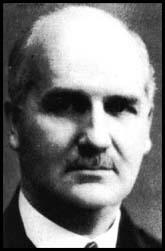Frederick Lindemann

Frederick Lindemann was born in Baden-Baden in 1886. He was educated at the University of Berlin and at the Sorbonne, where he carried out research into the problems of atomic heat that confirmed the theories first put forward by Albert Einstein. In 1911 he constructed a special calorimeter that measured specific heats at very low temperatures.
In 1914 Lindemann joined the Royal Flying Corps and was appointed director of its Experimental Physics Station at Farnborough. He was the first to develop the mathematical theory of aircraft spin and this was put into practice in air combat.
After the war Lindemann was appointed professor of experimental philosophy at Oxford University and director of the Clarendon laboratory.
Lindemann, a close friend of Winston Churchill, became the British governments leading scientific adviser during the Second World War. He controversially advocated the policy of area bombing of civilian populations. In 1942 Churchill appointed him paymaster-general and he held the post until the end of the war.
In 1945 he returned to his post at Oxford University and the Clarendon laboratory. He continued to advise the government on nuclear research and in 1956 he was created the Viscount of Cherwell. Frederick Lindemann, who created the Atomic Energy Authority, died in 1957.
Primary Sources
(1) Herbert Morrison, An Autobiography (1960)
The friendship between Churchill and Professor Frederick Lindemann was a remarkable one. Churchill did not permit friendship lightly. Indeed, though he had thousands of acquaintances, his real friends during the war were few.
He was a tallish man, who paradoxically attracted attention by the quietness with which he moved. There was never any bluster, never any excitement. His mind had a complete control over his emotions. His voice is difficult to describe, but was quite unique. There was an accent, but not definably mid-European. The tone was high-pitched, but it was not squeaky or effeminate. He often invited me to have a chat with him at Christ Church, Oxford, and I gained the impression that his reputation in Oxford generally was merely fair by the high academic standards of the University. Some of his critics were really his self-confessed enemies, and he was certainly capable of arousing hostility, but what was more useful he was able to feel quite unworried about the fact. His defeat when he had stood for parliament for the University seat seemingly did not affect him at all.
He was an ascetic: bachelor, vegetarian, teetotaller and non-smoker - traits which contrasted violently with those of his mentor Churchill. Perhaps this contrast in personality was a reason for their liking for one another, which transcended anything involved in the usefulness of one to the other. I do not think I am exaggerating in saying that the Prof would have died for Winston, and Winston would have resigned his office sooner than dispense with the Prof's services.
(2) Robert Boothby, Boothby: Recollections of a Rebel (1978)
I soon came to the conclusion that the policy of area bombing of Germany, then being pursued mainly by Wellington bombers, was not paying off, because the expenditure of our resources and, still more, of our skilled manpower, was far greater than the results achieved. Too many of our bombs were dropped in fields. German arms production was not being seriously interfered with. The best that could be said for it was that a considerable number of Goering's fighter aircraft, which might have been sent to other fronts, had to be kept in Germany. The truth is that in those days the instruments for accurate navigation did not exist. There were high hopes of one gadget, which I did not begin to understand; and which was brought to us one day in a brand-new Wellington bomber. All the navigators in the squadron went up to see how it worked. Five minutes after take-off, a wing fell off the plane, and they were all killed.
Early in 1942, Lindemann, by then a member of the Cabinet, circulated his famous paper on strategic bombing. This said that if it was concentrated entirely on German working class houses, and 'military objectives' as such were forgotten, it would be possible to destroy fifty per cent of all the houses in the larger towns of Germany quite soon. Charming! The paper was strongly opposed by the scientists, headed by Sir Henry Tizard and Professor Blackett. Tizard calculated that Lindemann's estimate was five times too high, and Blackett that it was six times too high. But Lindemann was Churchill's man; and Lindemann prevailed. After the war the bombing survey revealed that his estimate was ten times too high.
The story of the Lindemann-Tizard controversy has been well told by C. P. Snow in his book Science and Government; and I have not seen it seriously contradicted. But one thing remains to be said. I think the scientists underestimated the psychological effect of our bombing policy not upon the German but upon the British people. They themselves were under heavy bombardment; and between 1941 and 1944 bombing was the only method by which we could directly hit back. I am sure that it gave a tremendous boost to British morale; and that, to this extent at least, the thousands of brave and skilled young men in Bomber Command did not give their lives in vain.
